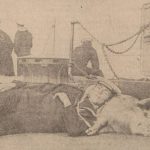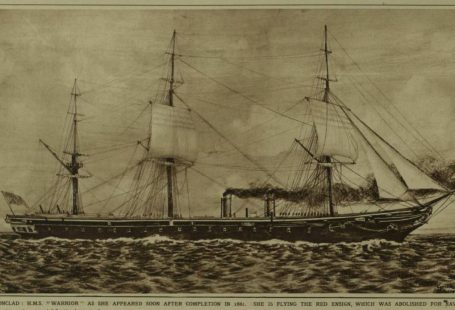We have been extremely busy over the past seven days here at The Archive adding an exciting array of brand new titles and pages to our collection. We have a bumper crop of new titles (twelve in all!), as well as updates to fourteen of our existing titles, covering England, Wales, Ireland and Northern Ireland. We are delighted to have added 141,258 new pages in all. Read on to find out more about our fabulous array of new regional, national and specialist titles.
Register now and explore the Archive
We are excited here at The Archive to bring you a snapshot of life one hundred years ago, through our new range of national and specialist titles. From illustrated publications, to those with a moral agenda, this week we are delighted to bring to you a rich selection of new titles, a veritable smorgasbord of social history.
Without further ado, then, let us introduce our first new title of the week – the Sunday Illustrated. The first edition of this photograph-packed newspaper appeared on 3 July 1921, featuring a front page full of images, from sporting matters to aircraft in flight. The Sunday Illustrated was the brainchild of Horatio Bottomley, the financier, journalist and MP, who began life in an orphanage and rose to become the editor of such publications as John Bull.
Sunday Illustrated | 31 July 1921
Using funds he had gained from his Victory Bonds scheme, Bottemley bought two newspapers (the National News and the Sunday Evening Telegraph). He renamed the National News to the Sunday Illustrated, moving his popular column from the Sunday Pictorial to his new venture. Although popularist in tone and subject matter, the paper languished, especially after Bottomley’s conviction for fraud. His Victory Bonds scheme was a sham; Bottomley was sentenced to 7 years’ imprisonment and died in poverty in 1933.
We also see this week the addition of a range of specialist titles, for instance Cox’s Legal Circular. Issued monthly for ‘solicitors and articled clerks,’ it contained an array of advertising pertinent to the legal profession, as well as information on upcoming legal examinations.
Another specialist title joining us this week is the Docks’ Gazette. Produced quarterly in London by the Staff Association of the Port of London Authority, this publication contains wonderful photographs of the docks, including in one edition images of a ‘record rum shipment,’ and as such is wonderful record of the happenings at London’s docks.
Docks’ Gazette | 1 January 1920
Two of our other new publications, however, would not have warmly welcomed the ‘record rum shipment’ as mentioned in the Docks’ Gazette. The prohibition movement had long been gaining traction in the United Kingdom from the Victorian era onwards, and two of our publications, appearing in 1915 and 1920 respectively, reflect the popularity of the movement.
We have added to our collection this week On the March, a London-produced title and the ‘Official Journal of the Royal Army Temperance Movement.’ Its colourful front page features a quote from no-one less than the King himself, George V, who was patron of the Royal Army Temperance Association. His quote reads: ‘It is my earnest desire that the ranks of this admirable organisation may be more reinforced and its good influence extended to every part of the kingdom.’
Furthermore, On the March features its own rallying call, explaining its noble intent:
The Promotion of Sobriety in the British Army at home and abroad, through the formation of Branches, whose object is to establish a strong regimental opinion in favour of strict sobriety, uprightness of character, and decency of language, in fear of God.
Featuring in its pages ‘scientific reasons for total abstinence,’ as well as some delightfully wholesome articles (including a ‘Wonderful Dog Story’ – read on for more of that), On the March was not alone in its campaigning. This week also sees the addition of the Prohibitionist, which was published in London on a monthly basis. Priced at one half penny, it advocated the ‘prohibition of the Liquor Traffic.’
Rounding off our new specialist titles is The War, a wonderful illustrated publication which appeared during the First World War. Subtitled ‘Nelson’s Picture Weekly,’ this newspaper is a fascinating record of wartime life. Chronicling, for example, ‘the first five months of Land War in Europe,’ and the ‘Havoc of the Wintry Sea,’ The War features photographs from all arenas of the conflict, even recording hospital life.
We now move onto our new local titles. Representing County Durham is the Chester-le-Street Chronicle and District Advertiser, which first appeared in 1891. Crossing over The Pennines into Lancashire, we have added the Manchester & Salford Advertiser. This newspaper ran from 8 January 1831 to the 26 August 1848, appearing every Saturday until it was incorporated with the Manchester Times.
We move down south for our next new title – namely the Hampshire Independent. This liberal weekly was established in Southampton, its first edition appearing on 28 March 1835. Changing hands several times, from first proprietor John Wheeler to its second Thomas Leader Harmen, who took the reins between 1840 and 1857, it was bought by the Hampshire Independent Company in 1859.
Hampshire Independent | 14 January 1837
In 1861, the Hampshire Independent made local history by becoming the county’s first ever penny paper, but this competitive pricing could not prevent a decline in circulation. The newspaper was sold again in October 1885 to philanthropist and liberal Passmore Edwards, who in turn sold it to the Hampshire Advertiser Company, who ran the Hampshire Advertiser, the bitter Conservative rival of the Independent. The two eventually merged in 1923, the last edition of the Hampshire Independent appearing on 20 July 1923.
We move even further south now for our next new title – the Jersey Evening Post. Produced in St Helier, and founded in 1890 by H.P. Butterworth, it was acquired by Walter Guiton a few weeks after its first appeance. Staying in Guiton’s family, the newspaper managed to weather the German occupation of Jersey between 1940 and 1945, although it was strictly supervised and censored. After the war, the Jersey Evening Post grew and grew, and in 2015 it celebrated its 125th anniversary.
Jersey Evening Post | 31 January 1899
Our final new titles this week hail from Ireland, namely the Clonmel Chronicle and the Kilkenny Moderator. Published in Clonmel, County Tipperary, the Clonmel Chronicle was published twice a week and ran from 1848 to 1935. Founded by Abraham Denroche in 1822, the Kilkenny Moderator was known for its Protestant-Unionist ethos, but it was also an enthusiastic supporter of the Gaelic League. To this end, it featured a weekly Irish language lesson. At the start of the First World War, Isabella Browne Lalor took over as editor-proprietor of the newspaper, an unusual position for women in Ireland at the time, after the death of her husband. The Kilkenny Moderator ceased publication in 1925.
We have also updated fourteen of our existing titles, with updates to newspapers from all over the British Isles and Ireland. You can find details of these exciting new updates at the bottom of this blog post.
A Wonderful Dog Story
As promised above, we now bring you a ‘Wonderful Dog Story,’ which we found in the pages of military temperance newspaper On the March. Billed as the ‘most extraordinary dog story of all time,’ it follows the adventures of Prince during the First World War.
In September 1914, a soldier named James Brown went to France with the North Staffordshire regiment. He left behind his wife, and dog, an Irish terrier named Prince. On the March tells us how ‘the dog and his master were very much attached and for some days Prince moped and refused to be comforted.’
The Browns had been staying in Ireland, but soon after Mrs Brown returned to England, visiting Stafford first, and thence to her home in Hammersmith. But then, tragedy struck, for ‘about a month after returning to London Prince was nowhere to be found.’ Mrs Brown wrote to her husband, breaking the news, but then she received the most unexpected reply.
Prince | On the March | 1 January 1920
James Brown wrote that Prince was safe with him in France. His loyal hound had suddenly appeared at Armentieres, where he was stationed, and had ‘greeted his master with the greatest display of affection.’ Prince and his master soon became celebrities; they paraded with Brown’s commanding officer, and the dog kept the men in good spirits with his ‘many tricks.’
James Brown said of Prince, he is a ‘very good dog and also an excellent fighter.’ But just how Prince made it from London, across the channel, to the Western Front, remains something of a mystery. On the March even carries a picture of the adventurous Prince, explaing how the dog had ‘condescended to pose for the photographer at the quarantine station,’ once he had arrived back in England.
You can read the full story here.
New Titles
Title |
Years Added |
| Manchester & Salford Advertiser | 1837-1840, 1842 |
| Hampshire Independent | 1837, 1842-1843, 1845-1846, 1848-1852, 1858-1878, 1880-1882, 1884-1885, 1888-1895, 1898-1900, 1903-1905, 1908-1910, 1912-1918, 1920-1923 |
| Clonmel Chronicle | 1848-1880, 1882-1896 |
| Jersey Evening Post | 1899, 1902-1903, 1905-1909 |
| Sunday Illustrated | 1921-1923 |
| Cox’s Legal Circular | 1916 |
| Docks’ Gazette | 1920 |
| On the March | 1920 |
| The War | 1915 |
| Prohibitionist | 1917-1918 |
| Chester-le-Street Chronicle and District Advertiser | 1913-1923, 1929-1940 |
| Kilkenny Moderator | 1828-1831, 1833-1840, 1849-1851, 1881, 1900-1902 |
Updated Titles
This week we have updated fourteen of our existing titles.
Title |
Years Added |
| Merthyr Express | 1946, 1948, 1952-1953 |
| Westmeath Guardian and Longford News-Letter | 1841-1851, 1853-1860, 1862-1896 |
| Richmond & Ripon Chronicle | 1857, 1859, 1889 |
| Scarborough Gazette | 1856, 1884 |
| Leinster Reporter | 1878, 1880 |
| Wakefield Express | 1862 |
| Saint James’s Chronicle | 1851-1866 |
| Baldwin’s London Weekly Journal | 1803, 1807, 1809, 1812, 1817-1820, 1822-1836 |
| Cannock Chase Courier | 1914-1928 |
| Midland Counties Advertiser | 1882 |
| Lynn Advertiser | 1891-1909, 1911-1912 |
| Meath Herald and Cavan Advertiser | 1854-1856 |
| Lisburn Standard | 1878, 1884-1885 |
| Sligo Independent | 1856, 1860-1869, 1920-1924 |
You can learn more about each of the titles we add to every week by clicking on their names. On each paper’s title page, you can read a FREE sample issue, learn more about our current holdings, and our plans for digitisation.
You can keep up to date with all the latest additions by visiting the recently added page. You can even look ahead to see what we’re going to add tomorrow
.













